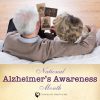According to the Center for Disease Control and Prevention (CDC), the number of people living with Alzheimer’s disease doubles every 5 years beyond the age of 65. In 2020, around 5.8 million Americans were living with the disease and this number is projected to nearly triple to 14 million people by 2060.
As individuals with Alzheimer’s progress further into the disease, they often require the assistance of a caregiver. Whether a professional or a family member, in-home care or work in memory care units of senior living communities, it’s important to understand the disease and how to manage it.
What is Alzheimer’s disease?
Alzheimer’s disease is a progressive disease beginning with mild memory loss involving parts of the brain that control thought, memory, and language. It can seriously affect a person’s ability to carry out daily activities and possibly lead to loss of the ability to respond to any given environment.
Understanding symptoms associated with Alzheimer’s
When you think of the word Alzheimer’s, what comes to mind? Memory loss, wandering, and confusion are likely on your list. It’s important to know that these common symptoms aren’t the only signs that your loved one may be suffering from Alzheimer’s. You may also notice:
- – Individuals who experience this form of memory loss may become aggressive, such as entering into physical altercations with caregivers while receiving assistance or even throw tantrums.
- – Alzheimer’s patients may become agitated with no apparent stimuli. Little things like the inability to find their keys or not liking what’s on the lunch menu may cause frustration.
- – Hallucinations may occur. Individuals may think they have visited with a friend, for example, but that friend has long since passed away or did not speak to the person that day.
- – It’s also common for people who have Alzheimer’s to become suspicious. They may think caregivers or senior living community staff are stealing their things, or even suspect that ghosts are moving their belongings around in the night.
- – You may also noticed that your loved one has trouble sleeping. He or she may nap for hours during the day and then be awake for long periods at night.
- – He or she may repeat words or phrases as if they were never said in the first place.
What should an Alzheimer’s caregivers know about combatting these behaviors?
In order to help or prevent harmful incidents from occurring, it’s important to understand why Alzheimer’s patients exhibit these behaviors.
- If there are specific experiences or items that trigger agitation or aggressiveness, avoid them.
- As for hallucinations, there isn’t much you can do. However, caregivers can speak to their loved ones’ doctors about adjusting any medications that have these side effects.
- Increasing security can help avert suspicion. For example, a senior woman who is constantly worried about her purse may feel better if they lock it in a safe each night and wear the key on a necklace to ensure she always has access, or give it to a trusted individual for safekeeping.
- Sleep issues can be mitigated with scheduled bedtimes and wakeup calls.
- Repetition of words or phrases often occurs because the senior has forgotten he or she already said something. You’ll have to simply exhibit patience and wait this out, or change the subject with an interruptive question. Seniors deserve respect, so make sure the individual feels that you are listening even if it’s the third time you’ve heard a story today.
What to do if you suspect Alzheimer’s disease
If you notice any of the above behaviors in your loved one, early intervention will make a difference in quality of life for both you, as the caregiver, and your loved one. Your healthcare provider can help determine if the symptoms you are experiencing are related to Alzheimer’s disease, or more treatable conditions such as a vitamin deficiency or a side effect from medication.
If you found an error, highlight it and press Shift + Enter or click here to inform us.



